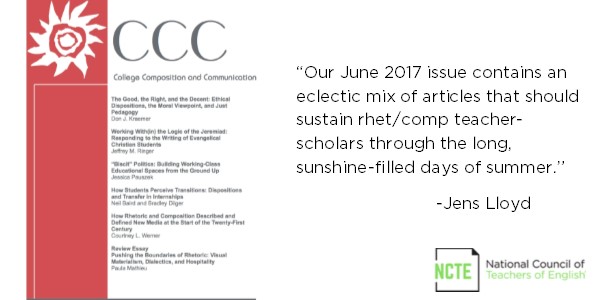This post is written by member Jens Lloyd, editorial assistant for College Composition and Communication.
College Composition and Communication publishes scholarship in rhetoric and composition studies that supports college teachers in reflecting on and improving their practices in teaching writing. Our June 2017 issue, available online and in print, contains an eclectic mix of articles that should sustain rhet/comp teacher-scholars through the long, sunshine-filled days of summer.
Don J. Kraemer takes a deep dive into recent scholarship on ethics and morality in the hopes of distinguishing between the two oft-conflated terms. He argues that we should not conceal the ethical and moral foundations of our pedagogical endeavors, especially insofar as articulating these foundations can help to build the kind of classroom environments where all students can thrive as writers. Jeffrey M. Ringer presents a case study of a student whose efforts to thrive as a writer in a college course led him to take up the genre of the jeremiad. Studying how this student’s faith informed his rhetorical choices, Ringer encourages rhet/comp teacher-scholars to thoughtfully engage with the various resources that students bring to bear on their writing.
Stepping outside of the formal confines of academia, Jessica Pauszek teaches CCC readers about Pecket Well College, an adult literacy center in Britain. Pauszek’s archival and ethnographic study makes for an engaging, inspiring portrait of how learners can direct their own literacy education. Also widening the focus beyond the college composition classroom, Neil Baird and Bradley Dilger present their findings from a CCCC-funded research project that scrutinizes metaphors of transfer by documenting how students succeed (or not) in internships.
Courtney L. Werner examines the recent history of rhet/comp to surmise how the field has defined new media in response to radical shifts in composing technologies. Werner carries out an extensive analysis of published scholarship, offering insights that will likely appeal to those well-versed in the topic and also to those looking for a foothold in the evolving subfield of computers and composition.
The issue concludes with Paula Mathieu reviewing three recent books that disclose new pedagogical, theoretical, and methodological vistas for rhet/comp teacher-scholars.
Some of our June authors are featured in our podcast series. Check out these interviews for additional insights into the scholarship we publish in CCC.
Whether you are settling into your summer teaching routine, taking on new research and writing projects, planning your courses for next school year, or just enjoying a brief respite, we hope you indulge in this issue and all that it offers. We welcome feedback and questions about the journal (and our podcast series!) at ccceditors@gmail.com.
Jens Lloyd is a PhD candidate at UC Irvine.

